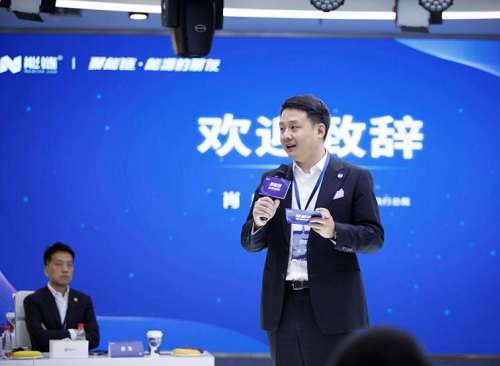"Energy Chain, Friends of Energy" Energy Chain Roundtable Conference Held
2021-10-13 14:14
On April 16, the domestic energy Internet of Things EIoT and the new energy retail platform Energy Chain held a round table conference entitled "Energy Chain, Friends of Energy" to discuss the transformation path of traditional private petrol stations with industry insiders, and held a comprehensive energy Hong Kong signing ceremony.
Xiao Guang, Co-founder and Executive President of Energy Chain Group; Xiaolin Ma, Partner of Energy Chain Cloud; Jiang Yong, Partner of Energy Chain Cloud and Vice President Operations of In-store Business Unit; Preparatory Office of China Clean Energy Industry Association, Deputy of Beijing Clean Fuel Industry Association Chairman, Professor Yin Qiang, senior economist at the professor level; Alex, Director of Daman International Private Label, Head of Daman Private Brand Business China; Lu Yao, Deputy General Manager of China Certification & Inspection Group Inspection Co., Ltd.; PICC P&C Chen Chuangxiong, head of the Tuanyou project, and many heads of petrol station companies attended the meeting.
The theme of this conference is "Friends of Energy", implying that Energy Chain will stand in the perspective of friends, focus on energy, integrate ecological resources, and work with the industry to face the challenges and drastic changes in the digital and zero-carbon era. Xiao Guang said that change is the only constant theme in the world. We believe that this industry should be firmly open and respond to new challenges through continuous innovation.
"Choosing to be a friend of energy is to be a friend of time and a friend of energy chain, because energy is the cornerstone of human development. Based on today, understand the past, embrace the future, we are in awe of this industry, and we continue to be brave in innovation."
Today, the energy retail industry is facing disruptive challenges. The analysis of the Boston Consulting Group's forward-looking report pointed out that three forces are fully impacting the industry: one is alternative fuels, the second is mobile travel technology, and the third is the ever-changing needs of consumers.
The report predicts that a large part of the fuel retail network may be unprofitable by 2050; about 80% of the fuel retail network currently constituted may not be profitable within 15 years.

How to deal with the challenges? The Boston report suggests that fuel retailers can take three actions, including enhancing the quality of existing products and advancing new value pools, transforming network functions and asset portfolios, and developing new capabilities and expertise.
Even in the current dimension, domestic private gas stations are also facing many difficulties. First, since 2018, the opening of the domestic oil product circulation market to foreign capital means that more international giants have poured into the domestic market; second, under the national reform requirements of “decentralization, regulation and service”, oil product circulation has been further market-oriented and anchored The effective NDRC guidance price will no longer exist, and the traditional price-cutting promotion methods of petrol stations will be difficult to impress consumers; third, the domestic tax control supervision is continuously strengthened, and the compliance cost of petrol stations has increased.
"The above-mentioned policy changes will greatly increase the compliance, marketing and operating costs of petrol stations, leading to a decline in assets. Coupled with the staking of state-owned enterprises and foreign capital, the industry will have a crowding-out effect." Jiang Yong said.